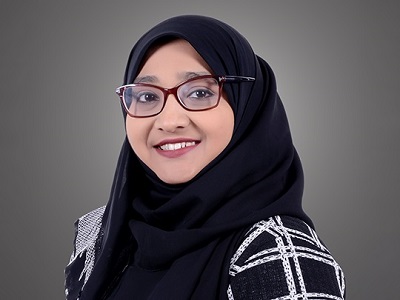Women in health and safety: An interview with Shermin Shali
Tuesday, 8 March 2022
8 March is International Women’s Day. In celebration of this day, and the wonderful women that work in the health and safety profession, NEBOSH spoke to NEBOSH Diploma holder and Alumni member, Shermin Shali about her experiences...

Shermin grew up in Kerala, India. Although she studied mechanical engineering and management, her desire to help others ultimately took her down a different and demanding path into health and safety.
Shermin moved to the Middle East with her husband and began her career there in an administrative support role, which led to involvement in audits around ISO 14001 and OSHA 18001. This sparked her interest in health and safety and she went on to achieve a NEBOSH International General Certificate and gained a health and safety role on a major construction project in Abu Dhabi. In 2017 Shermin went on to the gain a NEBOSH International Diploma and is now a QHSE Manager.
Did you face any challenges as a woman entering or progressing within the profession?
Yes, many times. As in any other industry or region, I experienced gender discrimination to a certain extent earlier in my career. My views were sidelined or not ‘heard’ and there was a non-inclusiveness on many occasions.
I invested in learning, created my own professional development program, tried to be visible and built confidence by actively taking part in professional groups. This helped me to develop the courage to speak confidently, disregarding any grin faces. I was so blessed to move to professional organisations which have uplifted my career and had opportunities to work with good mentors within my organisation and outside professional groups.
How has the HSE profession changed since you started working in it?
There is a positive change from then to now. I have been the very few or only woman in a crowd of 60-80 HSE professionals. It was challenging to convince the bigger group with your thoughts and opinions. Now, I can see many female faces, making great contributions and actively participating through many platforms.
It may be surprising to some, but at times there would not even be welfare facilities for women. The basics, such as a washroom, were often not available. When I say washroom – there was only a male urinal bowl and you had to depend on the closest public restrooms. Now, there is a consideration for the female welfare provisions.
There has been much progress in the UAE’s approach to women’s inclusion, justice and security. The UAE is ranked 24th among 170 countries and the highest regionally in the Georgetown Institute for Women, Peace and Security’s 2021 WPS Index (1).
What advice would you give to women interested in or starting out in the HSE profession?
Believe in yourself. Challenges will always be there, in many forms. If you are determined in your career path and keep yourself up to date then great things can happen. As a professional I polish and update my own skillsets to be able to compete in changing environments. Participating in mentoring programmes are another way to meet and learn from fellow professionals.
How can HSE professionals help to create an inclusive and diverse workforce?
This is a great need for the balanced society; gender is not a reservation for bringing success!
The law makers can play a vital role by establishing gender parity in their organisation. Policies and practices should be set to overcome occupational segregation by gender and there should be transparency to ensure there are no barriers to the advancement and wellbeing of women. Things we can do to create an inclusive and diverse workforce are:
- Encourage women-friendly culture
- Department/leadership level diversity
- Mother-friendly policies
- Flexible work schedule
- Maternity engagement and post maternity support
- Women safety and wellbeing measures
- Concession for memberships / conferences etc.
As HSE professionals we can influence leadership – and the wider workforce – by being firm, consistent and clear with our message. Use common platforms and encourage and empower others.
There are many other women, like Shermin, working in the health and safety profession. NEBOSH has published many of their stories and you can read these in the Case Studies page.
References
(1) World Economic Forum, Global Gender Gap Report 2021, https://www.weforum.org/reports/global-gender-gap-report-2021
